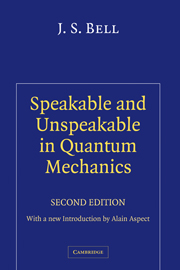Book contents
- Frontmatter
- Contents
- List of papers on quantum philosophy by J. S. Bell
- Preface to the first edition
- Acknowledgements
- Introduction: John Bell and the second quantum revolution
- 1 On the problem of hidden variables in quantum mechanics
- 2 On the Einstein–Podolsky–Rosen paradox
- 3 The moral aspect of quantum mechanics
- 4 Introduction to the hidden-variable question
- 5 Subject and object
- 6 On wave packet reduction in the Coleman–Hepp model
- 7 The theory of local beables
- 8 Locality in quantum mechanics: reply to critics
- 9 How to teach special relativity
- 10 Einstein–Podolsky–Rosen experiments
- 11 The measurement theory of Everett and de Broglie's pilot wave
- 12 Free variables and local causality
- 13 Atomic-cascade photons and quantum-mechanical nonlocality
- 14 de Broglie–Bohm, delayed-choice double-slit experiment, and density matrix
- 15 Quantum mechanics for cosmologists
- 16 Bertlmann's socks and the nature of reality
- 17 On the impossible pilot wave
- 18 Speakable and unspeakable in quantum mechanics
- 19 Beables for quantum field theory
- 20 Six possible worlds of quantum mechanics
- 21 EPR correlations and EPW distributions
- 22 Are there quantum jumps?
- 23 Against ‘measurement’
- 24 La nouvelle cuisine
3 - The moral aspect of quantum mechanics
Published online by Cambridge University Press: 11 April 2011
- Frontmatter
- Contents
- List of papers on quantum philosophy by J. S. Bell
- Preface to the first edition
- Acknowledgements
- Introduction: John Bell and the second quantum revolution
- 1 On the problem of hidden variables in quantum mechanics
- 2 On the Einstein–Podolsky–Rosen paradox
- 3 The moral aspect of quantum mechanics
- 4 Introduction to the hidden-variable question
- 5 Subject and object
- 6 On wave packet reduction in the Coleman–Hepp model
- 7 The theory of local beables
- 8 Locality in quantum mechanics: reply to critics
- 9 How to teach special relativity
- 10 Einstein–Podolsky–Rosen experiments
- 11 The measurement theory of Everett and de Broglie's pilot wave
- 12 Free variables and local causality
- 13 Atomic-cascade photons and quantum-mechanical nonlocality
- 14 de Broglie–Bohm, delayed-choice double-slit experiment, and density matrix
- 15 Quantum mechanics for cosmologists
- 16 Bertlmann's socks and the nature of reality
- 17 On the impossible pilot wave
- 18 Speakable and unspeakable in quantum mechanics
- 19 Beables for quantum field theory
- 20 Six possible worlds of quantum mechanics
- 21 EPR correlations and EPW distributions
- 22 Are there quantum jumps?
- 23 Against ‘measurement’
- 24 La nouvelle cuisine
Summary
The notion of morality appears to have been introduced into quantum theory by Wigner, as reported by Goldberger and Watson. The question at issue is the famous ‘reduction of the wave packet’. There are, ultimately, no mechanical arguments for this process, and the arguments that are actually used may well be called moral. This is a popular account of the subject. Very practical people not interested in logical questions should not read it. It is a pleasure for us to dedicate the paper to Professor Weisskopf, for whom intense interest in the latest developments of detail has not dulled concern with fundamentals.
Suppose that some quantity F is measured on a quantum mechanical system, and a result f obtained. Assume that immediate repetition of the measurement must give the same result. Then, after the first measurement, the system must be in an eigenstate of F with eigenvalue f. In general, the measurement will be ‘incomplete’, i.e., there will be more than one eigenstate with the observed eigenvalue, so that the latter does not suffice to specify completely the state resulting from the measurement. Let the relevant set of eigenstates be donoted by ϕfg. The extra index g may be regarded as the eigenvalue of a second observable G that commutes with F and so can be measured at the same time.
- Type
- Chapter
- Information
- Speakable and Unspeakable in Quantum MechanicsCollected Papers on Quantum Philosophy, pp. 22 - 28Publisher: Cambridge University PressPrint publication year: 2004



